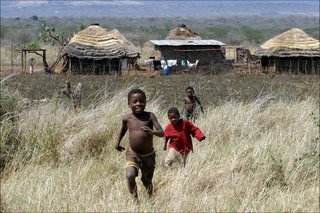Props to Africa - A situation comedy

The day before yesterday, it was my running shorts. One glance at me leaving work to jog home and the clinic nurses and translators burst into synchronous laughter.
Yesterday, it was my pronunciation of the SiSwati phrase “Sanibonani, S’Celile?” ("How are you, S’Celile?") Apparently my pronunciation needs some work.
I like being laughed at. It speaks volumes about who I appear to be in the eyes of others, and no ex-patriot is going to play a meaningful role in Africa or anywhere else for that matter unless he understands how silly he sometimes seems.
Being laughed at also assures me that those laughing are comfortable letting me in on the joke, the joke being an unwitting me. If a person is looking you in the eye while holding their sides as they shake with laughter, it bodes well for your working relationship.
At least this is what I tell myself.
Still the question remains: Why am I such an amusing spectacle here in Swaziland?
In the two instances above, I came up with the following: Regarding jogging, it must have to do with my willingness to running around in skimpy clothes for no particular reason in spite of the fact that I have a working automobile. (Combined, perhaps, with the blinding pallor of my sun-naïve legs.)
Regarding my blundering the local language, I attribute the laughter to my sloppy delivery of over-enunciated-but-still-mispronounced syllables coupled with the poorly-timed flicks of my untrained tongue in a feeble attempt to create the half-click-half-kissing noise that is woven into my colleague’s name—“S’Celile”. (Pronounced sss—kiss-like sound—eh—lee—lay.)
The kiss sound is actually less like a kiss and more like the sound that a wayward cowboy would make to get his well-trained horse to speed up without using his spurs.
You get the idea.
In a nutshell, Ryan in Swaziland seems analogous to one of those slightly outdated prop comedians (Gallagher, Carrot Top, and the like) who take something ordinary and use it out of context so that it is funny…or sort of funny…or simply annoying.
Of course, unlike yours truly, they do this intentionally and they receive remuneration for their efforts.
In my case, though I am ordinary by American standards, I am most certainly out-of-context here, and therefore my Swazi audience finds me funny or sort of funny or annoying from time to time.
Anyway, this is my working hypothesis. It is not a good or testable hypothesis, nor does it matter much either way.
Allow me to move on to a related topic that does matter.
The “developed world” has examined Africa for many years, and there has been little laughter. We observe from afar with the expectation of seeing darkness, disease, and despair, and so we see them.
Darkness, disease and despair make miserable punch lines.
Some observers do laugh at Africa. They seek opportunities to make derogatory, comparative statements emphasizing Africa’s deficiencies and then they chuckle sarcastically. Such sarcasm is not funny, and these chuckles are laced with ignorance and guilt, inspired by misplaced and heartless pride.
It makes me angry.
Let me tell you about Africa's darkness, disease, and despair from my vantage point.
The nights can get quite dark, darker still when the electricity goes out. (Most of Swaziland has no electricity to lose.) Having recently spent some time in darkness, I found that I prefer dim candlelight to that from a bleaching white bulb, and I have seldom seen brighter stars than those during a blackout.
There is much disease here, but there is also a growing understanding that these diseases can be treated. In all places, sickness can undermine a dignified life, and even diminish one’s will to live. Epidemics and fatalism are close traveling companions. In spite of this, Swaziland’s inhabitants love life, even when surrounded by or facing death. They want nothing more than to live long and be healthy, and I predict that they will have more and more opportunity to do both in the years ahead.
As for despair, it exists here, as it does everywhere. This is, after all, a country where a day’s work earns you an average of 2-3 dollars, necessities are often lacking, and luxuries are essentially absent. Still, I have yet to pass a family on the street and not be greeted. I have yet to shake a hand without it being coupled by a smile and a respectful sideways glance. I have yet to pay someone a compliment and not have it answered by a careful bow. The situation here is difficult, but the people respond with grace and resilience.
Within the context of the “developed world,” Africa may seem a dismal, desperate place. At least that is the story that is told. Hapless despair, I suppose, makes for a marketable human interest piece, and is certainly a sound if not cynical approach to fundraising.
I prefer to tell a different type of story, in which determined, benevolent people face adversity with endurance and a good sense of humor. These stories, I feel, should be the first ones told, for they are stories of hope.
Here is a working hypothesis for you, and I believe this one has been tested: Hope perpetuates itself, and hope in perpetuity has transformational power.
So, if you want to tell me a story about Africa, give me one where the protagonists laugh a lot, even if they are laughing at me.

Labels: Other stories


2 Comments:
well said, pH balanced.
Hi Ryan.Im from Swaziland but living outside the country.Nice to hear that you are doing such a good job for SD.May you be truly blessed!!I also have a name that sounds like Scelile, but have yet to hear a "mlungu" pronounce it well!
Post a Comment
<< Home